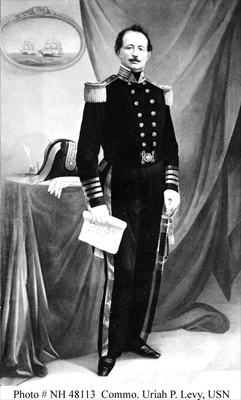Uriah Phillips Levy

(1792 - 1862)
Uriah P. Levy was the first Jewish Commodore in the U.S. Navy and a major philanthropist to Jewish causes in America.
Levy (born April 22, 1792; died March 26, 1862) was born into a Jewish family from Philadelphia, Pennsylvania. His grandfather, Jonas Phillips, originally moved to the United States from Germany in 1756 and eventually fought against the British during the American Revolution. At the age of ten, Levy left home to serve as a cabin boy on a trading ship. For his bar mitzvah at the age of 13, Levy returned home to celebrate with his family, though the following year he quickly returned to the sea.
Eventually joining the U.S. Navy, where he became a sailing master, Levy fought in the Barbary Wars and was later assigned to the U.S.S. Argus during the War of 1812 against the British. In August 1813, the ship Levy was sailing on was captured and the crew was
sent to Dartmoor Prison in England. Levy remained a prisoner at Dartmoor for
sixteen months. After his release, Levy returned to the U.S. and continued to serve in the Navy, rising to the ranks of lieutenant (1817), master commandant (1837), and captain (1844).
After witnessing flogging in the Navy firsthand, Levy
joined those who opposed corporal punishment and in 1838, while commanding the U.S.S. Vandalia, developed his own system of discipline, substituting
mild reforms for corporal punishment. Because of his refusal to inflict
corporal punishment on a young seaman, he was court-martialed and dismissed
from the service, however President Tyler overturned the decision.
In 1857,
the Navy dismissed forty-nine officers, including Levy, though he fought the
decision through a Court of Inquiry and was eventually reinstated. After his
reinstatement, he rose to command the Mediterranean fleet and received the
rank of Commodore, then the highest ranking in the Navy
A smart investor in New York City real estate, Levy became a rich man late in his Naval career and used his wealth as a very generous philanthropist, many times donating to Jewish-American endeavors. He served as the first president of the Washington Hebrew Congregation in Washington, DC and in 1854 he sponsored the new Jewish seminary of the Bnai Jeshurun Educational Institute in New York.
Also an ardent admirer of Thomas Jefferson, in 1836 Levy purchased
Monticello, the late President's estate, and publicly announced that he
intended to restore the property to its original condition and open it for
visitation. The house and grounds remained in the Levy family until the estate
was sold to the Thomas Jefferson Memorial Foundation in 1923.
Commodore Levy died on March 22, 1862 and was buried in Cyprus Hills in Brooklyn in his synagogue's cemetary.
He did, however, leave
behind many legacies. A statue of Thomas Jefferson commissioned by Levy,
stands today in the rotunda of the U.S. Capitol. In 1959, the Navy's oldest
Jewish Chapel located in Norfolk, Virginia, was renamed the Commodore Levy
Chapel in honor of Levy's dedication to his religion and his country. In December 2011, a statue of Levy, commissioned by two Jewish captains in the Navy, was unveiled outside of Philadelphia's Congregation Mikveh Israel, where Levy had his bar mitzvah back in 1805.
Sources: National Museum of
American Jewish Military History; Wikipedia; The Monticello; Naval History & Heritage Command; Jewish Institue for National Security Affairs |